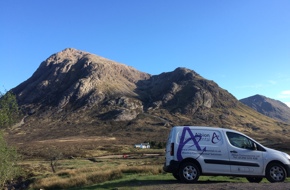Highlights
- Quickly adapted to new ways of working due to COVID-19.
- Quantified travel savings with a focus on reducing carbon emissions.
- Reduced corporate carbon impacts and identified sustainable ways of continuing these benefits post-COVID.

Albion Environmental is one of the UK’s leading consultancies specialising in waste management, environmental, and health and safety solutions. The small core team, based in Ayr, deliver advice, support and training to the waste management and construction industries in both the public and private sectors.
Whilst COVID-19 had presented a massive challenge to businesses and workers worldwide, Albion rose to this challenge by adapting quickly to new ways of working, including homeworking, whilst still undertaking essential site visits and vital monitoring work, as appropriate to restrictions (new COVID risk assessments were created). Their reductions in carbon emissions, achieved by reducing staff travel and increasing use of online training, is positive for the planet. Circumstances allowed Albion to build a more resilient and adaptable way of working in the longer-term, making the company more sustainable.
Albion delivered multiple training courses online during lockdown, calculating a saving of approximately 780 kg CO2-eq (carbon dioxide equivalent). Staff and clients alike even found that online inductions were easier to arrange and made the process smoother and faster for trainees. It was therefore determined feasible to continue to offer such services online so that Albion can maintain carbon savings whilst still providing the service their clients expect.
Under normal circumstances, the carbon emissions created by Albion’s staff per week as a result of commuting would be c.489 kg CO2-eq. As such, Albion saved a substantial 3.4 tonnes CO2-eq from being released into the atmosphere during lockdown, as staff were not commuting.
To continue to realise emissions reductions after lockdown, Albion looked at the possible carbon savings from several different options. Most of their staff drive into work, with little use of car-sharing or public transport, and so simply by exchanging the car for a greener mode of transport, such as the train, Albion’s staff could generate c.44% (213.8 kg CO2-eq) drop, in their weekly travel emissions.
Alternatively, having staff work from home on a regular basis (by spending at least one or two of their normal office days at home) could create a c.26% (129.4 kg CO2-eq) reduction in weekly travel emissions.
Another option considered was to replace all company vehicles with hybrid alternatives, which would result in c.22% (108.8 kg CO2-eq) decrease in travel emissions.
Although train travel delivered the best option for carbon savings, Albion concluded that encouraging staff to choose to work from home more often was the most viable opportunity. This has guided the following plans for maintaining emissions reductions relating to staff travel:
- Measures that promote cycling (Bike 2 Work Scheme), use of public transport, and car-sharing (once COIVD-19 is no longer a risk factor).
- Encouraging all staff to work from home for at least 30% of their working days by giving staff access to any homeworking equipment they would need and supplying all new staff with laptops so they can create portable working environments.
- Continuing to offer staff inductions online. Additionally, future training courses will be offered as online or in-person lessons, with clients incentivised to choose the online options through a discount.